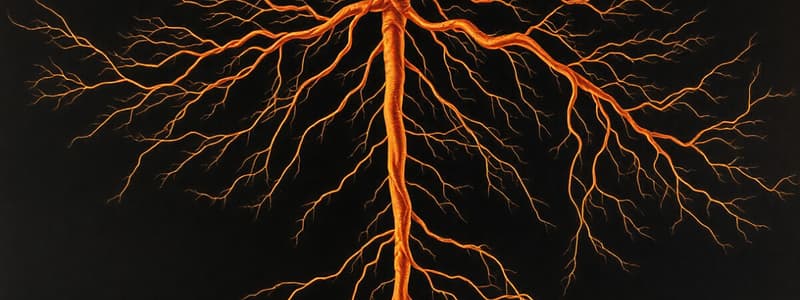Podcast
Questions and Answers
Which of the following functions is NOT directly influenced by the autonomic nervous system?
Which of the following functions is NOT directly influenced by the autonomic nervous system?
- Sweating
- Cognitive decision-making (correct)
- Heart rate
- Arterial pressure
Which organ system is responsible for GI motility and secretion?
Which organ system is responsible for GI motility and secretion?
- Peripheral nervous system
- Autonomic nervous system (correct)
- Somatic nervous system
- Central nervous system
Which of the following is a consequence of increased autonomic nervous system activity?
Which of the following is a consequence of increased autonomic nervous system activity?
- Decreased heart rate
- Increased GI secretion (correct)
- Reduced sweating
- Lower body temperature
What role does the autonomic nervous system play in urinary bladder emptying?
What role does the autonomic nervous system play in urinary bladder emptying?
Which of the following bodily functions is managed by the autonomic nervous system?
Which of the following bodily functions is managed by the autonomic nervous system?
Flashcards are hidden until you start studying
Study Notes
Autonomic Nervous System
- The autonomic nervous system (ANS) is responsible for regulating involuntary bodily functions.
- The ANS is divided into two main branches: the sympathetic nervous system and the parasympathetic nervous system.
Functional Anatomy of the ANS
- Autonomic Nerve Pathway:
- Extends from the central nervous system (CNS) to target organs.
- Consists of two-neuron chains:
- Preganglionic Fiber: Connects to the cell body of the second neuron in the chain.
- Postganglionic Fiber: Innervates the effector organ.
Sympathetic Nervous System
- Sympathetic nerve fibers originate in the spinal cord between T1 and L2/L3 (thoracolumbar region).
- The preganglionic fibers originate from nuclei of cranial nerves (CN) III, VII, IX, and X or from sacral spinal segments S2-S4.
- Sympathetic nervous system actions tend to be localized.
- It has an anabolic action, conserving body stores.
- Increases gastrointestinal secretion and motility (secretomotor).
Studying That Suits You
Use AI to generate personalized quizzes and flashcards to suit your learning preferences.



